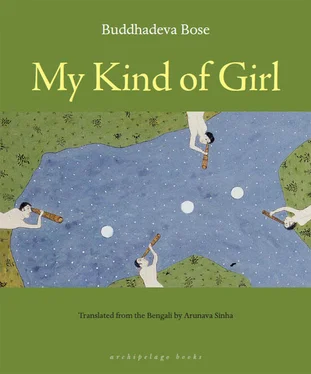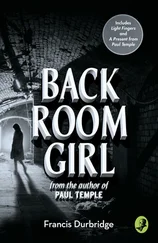The room had been echoing with the contractor’s deep baritone all this while. As soon as he stopped, night descended more heavily on the waiting room, attendant to its expectant silence. From afar, penetrating the veil of fog, came the sound of shunting, like a stifled moan during a dream, and from even further the sky was rent by the anguished cry of a dog. When the sounds died away, the Delhi man coughed mildly and said, “Is that the end of your story?”
“Do you need to hear more?” a smile appeared on the edge of the writer’s lips.
The senior bureaucrat, even accustomed as he was to everyone’s obsequiousness, was not thrown off his stride by that derisive smile. He asked gravely, “Perhaps I may be pardoned for asking a question: did the professor return the money?”
The contractor reached out for a cigarette. His hand was like a claw, the knuckles extremely thick and covered with hair. His face was so large that the small cigarette hanging from his lips looked rather ill-fitting. Blowing smoke like an amateur, he said, “This is all I know of Makhanlal’s story, I do not know the rest.”
“There is no need to, either,” the veteran writer observed. “What happened after that, whether he met the girl again, how she felt after insulting her benefactor, whether or not she used to pretend to read by the downstairs window in the hope of seeing that huge, ugly man once more — all this is irrelevant. The girl of our dreams, who lives in our heart, Makhanlal wanted to see her for one time as a real person — that is all that is real, all that matters, nothing else does. Surely Makhanlal would have married a girl of his mother’s choice after they moved to their new house — by now he must have a full family of his own, children, he must be earning a lot, too — but none of these subsequent events can cancel out the earlier one. Whatever Makhanlal had to get from his Malati, he has gotten already, he will never lose that, don’t you think?” the writer looked at the contractor as he concluded.
“Never mind, Makhanlal, it’s the others’ turn now,” the contractor showed his large teeth as he laughed.
“Your turn,” the doctor winked at the bureaucrat.
The man from Delhi seemed prepared. He didn’t waste his time refusing — he had probably planned his own story while he had been listening to the previous one; probably the result of office discipline. Just as he did his work on time in the office, so he started his story the same way, in a low, smooth voice, using small words. .
Chapter Three.GAGAN BARAN’S TALE
My name is Gagan Baran Chatterjee. I am a minor celebrity in Delhi and Shimla, where they know me as G.B. Chatterjee. The initials G.B.C. have been scrawled on important government documents at least a thousand times. I went to England at twenty-one, and upon my return at twenty-four, I got a job in Delhi. I’ve lived there ever since. So long have I been there that I can no longer imagine living, or ever having lived, anywhere else. After retirement? I’ve made arrangements for that too. I have a house at Civil Lines in Delhi, you can see the Yamuna from the veranda. Bengal’s damp climate doesn’t suit my wife’s health — her father used to be the principal at Agra College. Our children speak in Hindi-laced Bengali, and they speak in English even more. Even this conversation with all of you in Bengali — this too is new for me. I hardly ever have these trysts with Bengal anymore, I don’t even feel any attraction. Once in a blue moon when I do go to Calcutta it’s on official work, I don’t stay a day longer than necessary.
And yet it was in Bengal that I was born, that I grew up, that the first chapter of my life was spent. Back then, in that distant childhood, could I ever have imagined myself as I am now? Nor, for that matter, can I now picture that boy, that shy young man, as the first edition of myself. All those memories seemed to have been wiped clean, I thought I had forgotten them all — but suddenly, after our conversation, it’s all come back so clearly.
I remember a boy from an ordinary Bengali family, aged seventeen, studying at a small town college. Having won a scholarship for my matriculation results, I was at the center of everyone’s intense expectations; most of my time was spent trying to live up to those expectations. You may find it hard to believe now, but I really was an innocent back then, the quintessential “good boy,” ever obedient, a hardworking student, extremely courteous to all and sundry to the point where I didn’t even dare look anyone in the eye.
But so what? Within me, the spirit of seventeen was quietly doing its work. You spoke of love; I used to dream of it too. Learning the formulae of chemistry had taken so much effort, but the basic formulae of life were there to be learned on their own; they advised trying to add color to one’s life, if temporary, and I was no exception to this. Countless were the number of novels I lapped up in between textbooks, all the titles you get in our small town. Yes, I even read — as a writer, you’ll laugh — even poetry. In poetry or in prose, wherever there was romance, there my heart received its sustenance — and how strange it was too, not all the writing in the world could alleviate my longing. The more I heard about love, the more I wanted it.
Today, I feel that no matter how much I heard about love through the written word, I heard nothing; even if I did, I did not listen. But when I heard it at seventeen, from Pakhi, melody flowed from flutes to fill the skies.
Yes, back at that distant age of seventeen, Pakhi had loved me. I can recollect her exact shape as I speak, she’s coming to life before my eyes. Black eyes. It was in those eyes that love was born, in those eyes that love lived its life; in those extremely conservative times, there was no other language available to us. I would be present as others talked amongst themselves, and so would she — but I cannot remember our having said a single word to one another then. Or perhaps that conversation of the eyes was a form of dialogue, one that sated whatever hunger we felt then. At least, we harbored no hope of anything more, nor did we have the opportunity for it.
But this same Pakhi finally spoke one day — one night, on a winter night such as this one.
It was about three in the morning. Imagine a small town, the road cutting through an enormous field to one side, fog all over, and the pale radiance of a dented moon hanging in the sky. The play staged at the Railway Club had just ended — it was a major annual event — and every home was represented in the audience. The women were the eager ones, the majority of the men present merely escorts. That exalted post was mine for the night, despite my youth, simply by virtue of my being a male. While the elders were reluctant, there I was, jobless and without any examinations looming before me — entirely available in other words, which was why the womenfolk pinned me down. I wasn’t very keen, but in those days it was simpler to do something, even unwillingly, than to refuse.
The women still sat behind a screen back then, but there had never been anything to block out their voices. Even if I could not see them, I could hear them, their giggling, their conversations, their bickering over seats, their observations about the play, their admonitions to their children; a mix of peculiar cries. There was plenty of shouting on stage too. As I nodded off sleepily, I felt I was watching two different plays, no, three — for since I was sitting close to the stage I could hear the prompting too, not to mention the fact that Draupadi and Bhimsen could be seen smoking on the side, occasionally. This three-piece din went on and on, showing no signs of relenting — I kept dropping off every now and then — but the play simply would not come to an end.
Читать дальше












